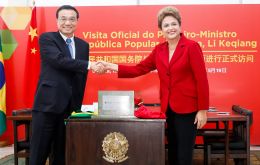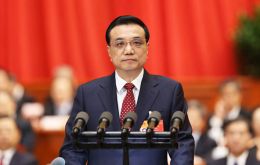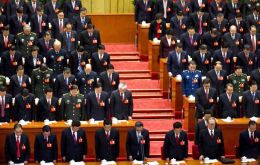MercoPress. South Atlantic News Agency
Tag: Li Keqiang
-
Saturday, May 23rd 2015 - 10:27 UTC
China and Peru agree to study feasibility of transcontinental railroad

China and Peru have agreed to study the feasibility of a controversial 5,300 km transcontinental railroad that will connect Peru's Pacific coast with Brazil's Atlantic coast, China's official Xinhua News Agency reported.
-
Friday, May 22nd 2015 - 08:52 UTC
PM Li Keqiang in Bogotá: China and Colombia considering free trade accord

Chinese Premier Li Keqiang vowed to deepen economic ties with Colombia after arriving to Bogotá on Thursday, as part of his four-nation South American tour aimed at boosting trade and investment. Li is the highest-ranking Chinese official to visit Colombia since the two nations established diplomatic ties 35 years ago and his visit was hailed as historic by President Juan Manuel Santos.
-
Wednesday, May 20th 2015 - 05:44 UTC
Beijing to the rescue of sliding Brazil: 53bn dollars in trade, finance and investment

Beijing has come to the rescue of Brazil's slumping economy with trade, finance and investment deals worth at least 53 billion dollars in energy, mining, aviation and upgrading of dilapidated infrastructure.
-
Tuesday, May 19th 2015 - 07:33 UTC
Chinese PM in Brasilia; Beijing prepared to invest 100bn in transport and energy

China's Premier Li Keqiang arrived in Brasilia on Monday to sign agreements on infrastructure, energy and aviation that experts say could reach 100 billion dollars. The South American tour also includes Colombia, Peru and Chile and aims to restructure China's resource-driven trade with Latin American countries by including more value-added products.
-
Friday, May 15th 2015 - 07:23 UTC
Brazil waiting for 50bn dollars of Chinese support to overhaul infrastructure

China will invest 50 billion dollars to help overhaul Brazil's aging infrastructure, the government announced on Thursday, ahead of an official visit by Chinese Prime Minister Li Keqiang next week. Brazil has repeated that it was determined to overhaul its dilapidated roads, railways, airports and ports.
-
Friday, March 6th 2015 - 18:21 UTC
China lowers 2015 growth estimate to 7%; in 2014 expansion was the slowest in 24 years

Shares in China fell after the country's government set its official growth target at 7% for this year. The rate is lower than last year's target of 7.5%, which China missed after it grew at the slowest pace in 24 years. The Shanghai Composite closed down 1% at 3,248.48, while Hong Kong's Hang Seng ended 1.1% lower at 24,193.04.
-
Wednesday, January 7th 2015 - 06:20 UTC
Brazil sends foreign minister to China/Celac meeting in Beijing

Brazil's new foreign minister Mauro Vieira has left for Beijing to attend the first ministerial meeting between China and the Community of Latin American and Caribbean States, CELAC, according to reports from Brasilia.
-
Saturday, September 20th 2014 - 00:04 UTC
Why China's insatiable appetite for coal has likely peaked

A recent report from Greenpeace found that China's coal consumption declined in the first half of this year and new Chinese government data suggests that the country's coal imports have dropped. Estimates indicate that by the end of the year, China's coal imports could be 8 percent below 2013 levels.
-
Friday, March 14th 2014 - 10:12 UTC
China's first two months industrial output figures feed fears of a slowdown

China's industrial output rose 8.6% in January and February, according to the National Bureau of Statistics. Retail sales - a key measure of consumer spending - also increased 11.8% from the year before, government figures show. The figures were less than analysts had been expecting, adding to fears of a slowdown.
-
Saturday, November 9th 2013 - 18:03 UTC
China begins secret meeting to decide reforms and course of next decade

China began a four-day secret meeting on Saturday to set a reform agenda for the next decade as they try to push more sustainable growth after three decades of breakneck expansion. But analysts have cautioned against expectations for big changes as they say stability remains the watchword for the leadership.
